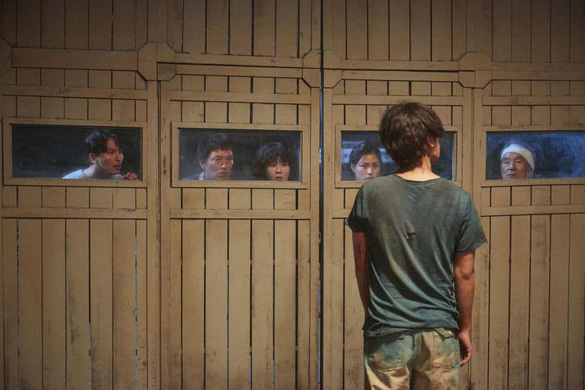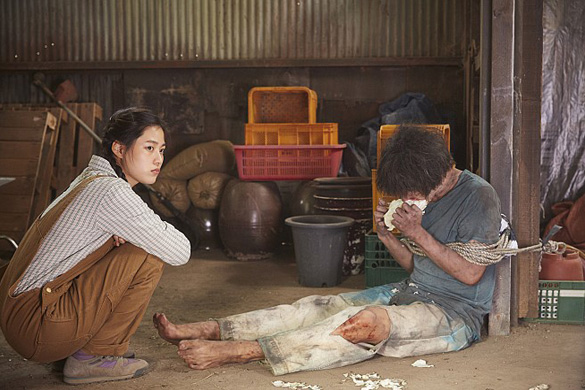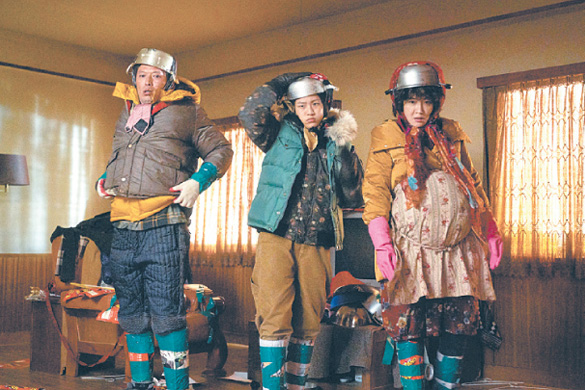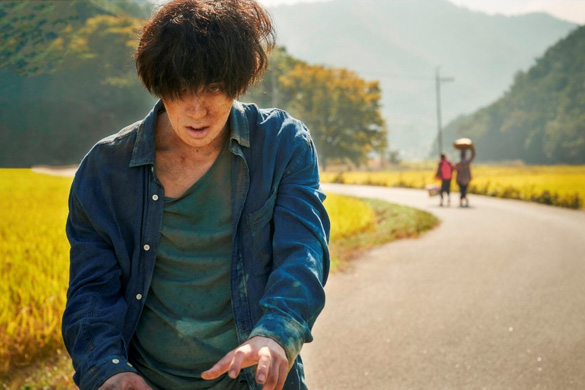"You killed another one? What's wrong with you?
Cant't you keep them alive for more than a month?
Don't bother the neighbours, go and bury it properly..."
Synopsis:
As diabetes sufferers increasingly complain that a medication from pharmaceutical company Human In Bio is causing serious side-effects, one such victim (Jung Ga-ram) who has turned into a fully-fledged, flesh craving zombie staggers into the small rural village of Poongsan, situated in the ‘boonies', as locals put it. Soon facing off against and indeed fleeing from an aggressive-looking, slobbering dog he takes refuse in a nearby dilapidated gas station where he is quickly discovered by the owner's father, Man-deok (Park In-hwan) whom he straight away takes a bite out of.
On realising the man is one of the walking dead, the gas station owner, Joon-geol (Jung Jae-young), and the rest of his family fear their father will soon become undead too but instead he not only retains the ability to speak but also starts to look and feel much younger and healthier. Other elderly locals also notice the sudden spring in Man-deok’s step and begin offering him money to share the secret of his newfound vitality leading him to realise he could make a load of easy cash by getting the zombie to bite each and every one of them.
However, he is blissfully unaware of the absolute carnage he is about to unleash...
Review:
Familial dysfunction has long and regularly been a core element of numerous Korean film narratives, not least in the comedy genre. Whether you consider New Korean Cinema wave classics of the 90s and early 2000s such as The Quiet Family or Just Do It or look at more recent comedic endeavours like The Fox Family and Boomerang Family, for example, thematic similarities exist pretty much across the board regardless of a specific film's individual narrative. Character quirks, eccentricities, incompetence and/or inadequacies more often than not form a springboard from which the majority of the humour present stems, in the process shaping the characters' often ill-considered choices, actions and follies (often in the pursuit of money even if getting it means scamming others) which in turn ultimately bring them together as a cohesive family unit.
All of that is certainly the case in The Odd Family but while many Korean film fans will be aware there are many similarities in the dysfunctional family elements to those seen in very well known and indeed classic films such as some of those mentioned above, the intelligent intricacies of the genuinely funny humour and dialogue attached to them, for me, made them a joy to watch, feeling familiar with a certain amount of originality rather than simply appearing as a rehash of what’s already been done – whether you consider Joon-geol’s constant, repeated stressed-out mutterings to himself in criticism of other family members (“A pregnant woman shouldn’t be allowed to use words like that”; “Aren’t we going to have meat to celebrate this rare gig? Jeez, I’m sick of it! She’s virtually a vegetarian!”) and indeed the bickering between them; look at his hugely violent interactions with the zombie who he of course considers an unwanted outsider, all followed with a pleading “I didn’t mean to do that” (he knocks him off a bridge with his truck; he fly kicks him into a wall with a spike that impales him; and kicks and punches him off his young sister, Hye-geol (Lee Soo-kyung), thinking he’s trying to bite her when in fact the interaction between the two is a cross between a desire for cabbages (yes, cabbages) to quench a virtual addiction and almost a romantic interlude); or if you indeed think about the changing feelings of Hye-geol for the zombie (whom she names Zzongbie), moving from treating him almost as a pet in the wake of inexplicable death after death of rabbits in her care to a relationship of sorts far warmer and more loving than that she feels about any of her actual family.
And while we’re on the subject, how can a relationship build or have any chance of working when it’s between a young woman and a zombie? Well, that’s where narrative originality once again comes into play and in fact forms the basis for the film’s entire climatic conclusion, saucepans on heads n'all.
 |
Director Lee Min-jae also pays homage in The Odd Family to some hugely well known, lauded and successful Korean horror/thrillers from the very biggest names: For example, following The Odd Family’s opening credits (accompanied by visuals showing Zzongbie crawling out of a manhole in a secure fenced area while audio media broadcasts explain the zombie virus having been created by Human In Bio’s dubious drug trials), we are taken late at night to a road of numerous accidents where a couple have a tyre blowout as a result of sharp tacks strewn in the road. They are soon approached by a shadowy figure in a large raincoat with a hood hiding his face who tries to open the locked car door with the now terrified inhabitants quaking inside.
The man turns out to be Joon-geol who 'just so happens' to be in the area (the implication being that he’s responsible for the tacks in the road, using the accidents caused as a way of scamming expensive repairs from unaware car owners) but before we discover that he is the seemingly ominous but ultimately comical figure his approach and actions outside the car are so reminiscent of an early scene from Kim Jee-woon’s I Saw the Devil (where Choi Min-sik approaches the car of Lee Byung-hun's fictional wife before breaking in, knocking her unconscious and abducting, killing and cutting her up) that comparisons can hardly fail to be made.
In fact the similarities are such that I guarantee the scene's use is both a means of deliberately setting up an initial creepy feeling by an overt nod and a wink film reference (allowing him to deftly turn it to parody when Joon-geol’s grinning face is finally revealed) as well as serving as a hat-tipping tribute to a now classic Korean horror, as it were, rather than being any sort of cinematic plagiarism, if you will.
 |
Lee Min-jae is also obviously aware that virtually any discussion of a Korean film featuring zombies can hardly fail to reference Yeon Sang-ho’s box office smash Train to Busan and as such he again tips his hat by having the odd family watch a scene from the film on a smartphone when Joon-geol’s younger brother is explaining what a zombie is.
However, while these overt references work like a charm and will easily put a smile on the face of virtually any Korean film fan, the true strengths of The Odd Family are in its warmly quirky narrative peppered with constant tiny moments of genuine hilarity; the genuinely funny eccentricities of its various characterisations; the perfectly deadpan delivery of gently comedic, idiocentric dialogue by (especially) actor Jung Jae-young and actresses Uhm Ji-won and Lee Soo-Kyung; and indeed the success of taking a zombie based story in a somewhat unexpected and wholly tongue in cheek direction.
Just make sure you have a cabbage handy in case you get peckish and keep a saucepan nearby for any head protection needed.
 |
Summary:
The Odd Family: Zombie on Sale is inherently and deliberately silly but that fact in itself is a plus point in this case and any film fans (Korean or other) looking for a couple of horror/comedy hours of sheer tongue in cheek, genuinely funny zombie escapism could do a lot worse than check it out, regardless of whether they have a cabbage addiction or not.
THE ODD FAMILY: ZOMBIE ON SALE (기묘한가족) / 2019
Director: Lee Min-jae
Starring: Jung Jae-young, Uhm Ji-won, Lee Soo-kyung
|





